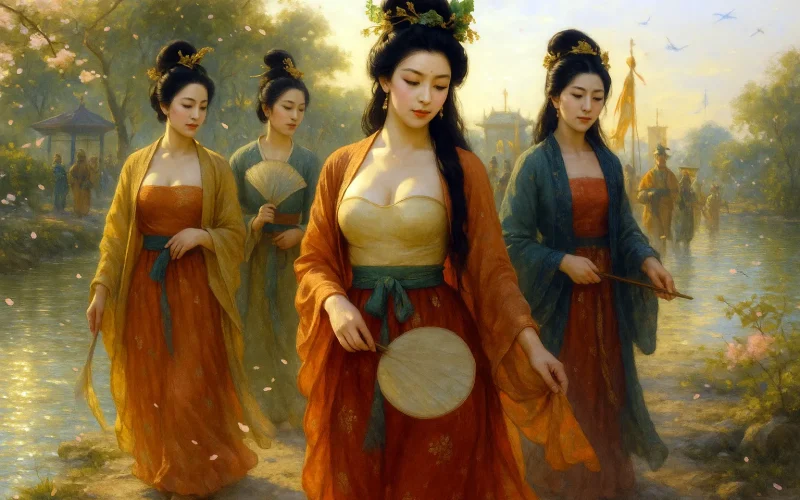North of me, south of me, spring is in flood,
Day after day I have seen only gulls....
My path is full of petals -- I have swept it for no others.
My thatch gate has been closed -- but opens now for you.
It's a long way to the market, I can offer you little --
Yet here in my cottage there is old wine for our cups.
Shall we summon my elderly neighbour to join us,
Call him through the fence, and pour the jar dry?
Original Poem
「客至」
杜甫
舍南舍北皆春水,但见群鸥日日来。
花径不曾缘客扫,蓬门今始为君开。
盘飧市远无兼味,樽酒家贫只旧醅。
肯与邻翁相对饮,隔篱呼取尽余杯。
Interpretation
"A hearty welcome to Vice-prefect Cui" was composed in the spring of the second year of the Shangyuan era of Emperor Suzong of the Tang Dynasty (761 AD), during Du Fu's second year of settling in his thatched cottage in Chengdu. At the time, Du Fu had endured the upheaval of the An Lushan Rebellion, living in hardship and poverty. Though his thatched cottage was humble, it provided him with a temporary sense of peace. The visit of Cui Mingfu brought Du Fu a long-lost sense of friendship and warmth, and he expressed his joy in this poem. The poem not only captures the beauty of rural scenery but also conveys a deep sense of human connection, reflecting Du Fu's simple and sincere emotions.
First Couplet: "舍南舍北皆春水,但见群鸥日日来。"
Shě nán shě běi jiē chūn shuǐ, dàn jiàn qún ōu rì rì lái.
To the south and north of my cottage, spring water surrounds; every day, flocks of gulls come and go.
This couplet depicts the tranquil scenery around the thatched cottage. The rippling spring water and the graceful flight of gulls create a fresh and serene rural scene. The word "surrounds" (皆, jiē) emphasizes the expanse of the spring water, while "every day" (日日, rì rì) conveys the leisurely presence of the gulls. This imagery not only highlights the poet's peaceful, reclusive life but also sets the stage for the arrival of the guest.
Second Couplet: "花径不曾缘客扫,蓬门今始为君开。"
Huā jìng bù céng yuán kè sǎo, péng mén jīn shǐ wèi jūn kāi.
The flower-lined path has never been swept for guests; today, I open my humble door just for you.
The poet uses colloquial language, making the lines feel intimate and natural. The "unswept path" suggests the poet's quiet, solitary life, with few visitors. "Just for you" (今始, jīn shǐ) expresses his respect and joy at Cui Mingfu's visit. The mention of the "flower-lined path" and "humble door" modestly describes the simplicity of his home, but the sincerity of his feelings shines through.
Third Couplet: "盘飧市远无兼味,樽酒家贫只旧醅。"
Pán sūn shì yuǎn wú jiān wèi, zūn jiǔ jiā pín zhī jiù pēi.
The market is far, so the meal is simple; my home is poor, and I can only offer old, homemade wine.
The poet modestly describes his humble circumstances, with a simple meal and only aged, homemade wine to offer. While this may seem like an apology, it actually reflects the genuine friendship between host and guest. The plain and unadorned language reveals the poet's contentment with a simple life.
Fourth Couplet: "肯与邻翁相对饮,隔篱呼取尽余杯。"
Kěn yǔ lín wēng xiāng duì yǐn, gé lí hū qǔ jìn yú bēi.
If you are willing to drink with my elderly neighbor, I will call him over through the fence, and we can finish the wine together.
This couplet takes a sudden turn, showcasing the poet's warm hospitality and close relationship with his neighbors. The phrase "call him over through the fence" (隔篱呼取, gé lí hū qǔ) vividly captures the simple, natural interactions of rural life, revealing the warmth of human connection in everyday moments.
Overall Appreciation
"A hearty welcome to Vice-prefect Cui" is a poem imbued with rustic charm. The poet weaves together rural scenery, everyday language, and genuine emotions to create a heartwarming "springtime guest reception scene." The opening lines paint a tranquil rural picture of rippling spring water and graceful gulls. The following lines describe the guest's arrival, using plain and unadorned words to express respect for the visitor. The third couplet portrays the humble hospitality, reflecting sincerity despite poverty. The final couplet introduces the neighbor, highlighting the poet's simple and amiable character. The poem moves from stillness to activity, with emotions deepening from subtle to intense, blending sincerity and warmth.
Writing Characteristics
- Fresh and Natural Rural Imagery: The opening couplet depicts the serene rural scenery of spring water and gulls, creating a poetic and picturesque atmosphere around the thatched cottage.
- Colloquial Language, Sincere Emotion: The poem is narrated in a conversational tone, with language that is intimate, plain, yet deeply emotional, feeling authentic and natural.
- Lifelike Detail: Details such as the "unswept path," "simple meal," and "calling through the fence" vividly portray the poet's humble yet hospitable nature.
Insights
This poem demonstrates Du Fu's ability to maintain a positive and open-hearted attitude even in difficult circumstances. It reminds us that true friendship lies not in material wealth but in mutual sincerity and care. Through plain and unadorned language, the poet reveals the warmth of ordinary life, encouraging us to cherish moments with friends and neighbors, sharing the simple joys of life even in challenging times.
Poem translator
Kiang Kanghu
About the poet

Du Fu (杜甫), 712 - 770 AD, was a great poet of the Tang Dynasty, known as the "Sage of Poetry". Born into a declining bureaucratic family, Du Fu had a rough life, and his turbulent and dislocated life made him keenly aware of the plight of the masses. Therefore, his poems were always closely related to the current affairs, reflecting the social life of that era in a more comprehensive way, with profound thoughts and a broad realm. In his poetic art, he was able to combine many styles, forming a unique style of "profound and thick", and becoming a great realist poet in the history of China.












